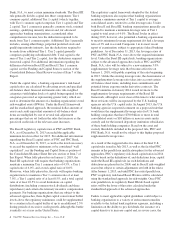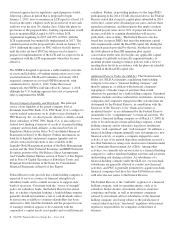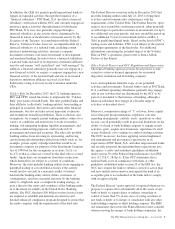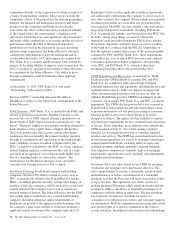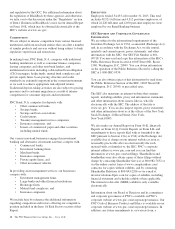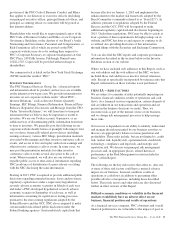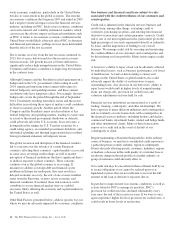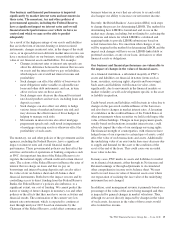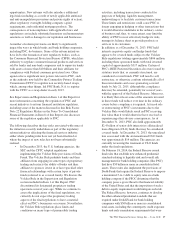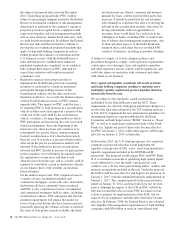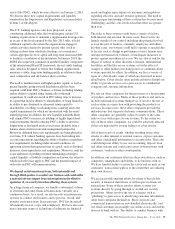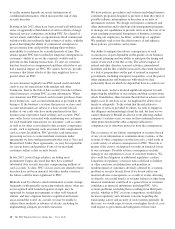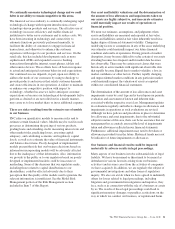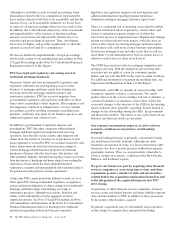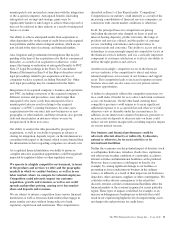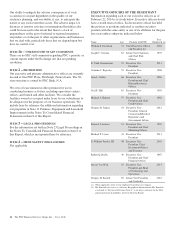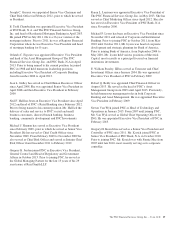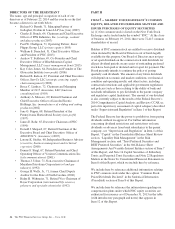PNC Bank 2013 Annual Report Download - page 34
Download and view the complete annual report
Please find page 34 of the 2013 PNC Bank annual report below. You can navigate through the pages in the report by either clicking on the pages listed below, or by using the keyword search tool below to find specific information within the annual report.Our business and financial performance are dependent on
our ability to attract and retain customers for our
products and services, which may be negatively impacted
by lack of consumer and business economic confidence as
well as our actions, including our ability to anticipate and
satisfy customer demands for products and services.
As a financial institution, our performance is subject to risks
associated with the loss of customer confidence and demand.
Economic and market developments, in the United States,
Europe or elsewhere, may affect consumer and business
confidence levels. If customers lose confidence due to a weak
or deteriorating economy or uncertainty surrounding the future
of the economy, the demand for our products and services
could suffer.
We may also fail to attract or retain customers if we are
unable to develop and market products and services that meet
evolving customer needs or demands or if we are unable to
deliver them effectively to our customers, particularly to the
extent that our competitors are able to do so.
News or other publicity that impairs our reputation, or the
reputation of our industry generally also could cause a loss of
customers.
If we fail to attract and retain customers, demand for our loans
and other financial products could decrease, we could
experience adverse changes in payment patterns and
consumers may not seek investments with us. We could lose
interest income from a decline in credit usage and fee income
from a decline in investments and other transactions. PNC’s
customers could remove money from checking and savings
accounts and other types of deposit accounts in favor of other
banks or other types of investment products. Deposits are a
low cost source of funds. Therefore, losing deposits could
increase our funding costs and reduce our net interest income.
For several years, the United States has been in a very low
interest rate environment. This situation has decreased the
attractiveness of alternatives to bank checking and savings
accounts, some of which historically have provided higher
yields but may lack deposit insurance and some of the
convenience associated with more traditional banking
products. If interest rates were to rise significantly, customers
may be less willing to maintain balances in non-interest
bearing or low interest bank accounts, which could result in a
loss of deposits or a relatively higher cost of funds to PNC.
This could also result in a loss of fee income.
In our asset management business, investment performance is
an important factor influencing the level of assets that we
manage. Poor investment performance could impair revenue
and growth as existing clients might withdraw funds in favor of
better performing products. Additionally, the ability to attract
funds from existing and new clients might diminish. Overall
economic conditions may limit the amount that customers are
able or willing to invest as well as the value of the assets they
do invest. The failure or negative performance of products of
other financial institutions could lead to a loss of confidence in
similar products offered by us without regard to the
performance of our products. Such a negative contagion could
lead to withdrawals, redemptions and liquidity issues in such
products and have a material adverse impact on our assets under
management and asset management revenues and earnings.
As a regulated financial services firm, we are subject to
numerous governmental regulations, and the financial
services industry as a whole is subject to significant
regulatory reform initiatives in the United States and
elsewhere.
PNC is a bank holding company and a financial holding
company and is subject to numerous governmental regulations
involving both its business and organization.
Our businesses are subject to regulation by multiple banking,
consumer protection and securities regulatory bodies.
Applicable laws and regulations restrict our ability to
repurchase stock or to receive dividends from subsidiaries that
operate in the banking and securities businesses and impose
capital adequacy requirements. PNC’s ability to service its
obligations and pay dividends to shareholders is largely
dependent on the receipt of dividends and advances from its
subsidiaries, primarily PNC Bank, N.A. The Federal Reserve
requires a bank holding company to act as a source of
financial and managerial strength for its subsidiary banks. The
Federal Reserve could require PNC to commit resources to
PNC Bank, N.A. when doing so is not otherwise in the
interests of PNC or its shareholders or creditors.
Applicable laws and regulations restrict permissible activities
and investments and require compliance with protections for
loan, deposit, brokerage, fiduciary, mutual fund and other
customers, and for the protection of customer information,
among other things. We are also subject to laws and
regulations designed to combat money laundering, terrorist
financing, and transactions with persons, companies or foreign
governments designated by U.S. authorities.
Starting shortly after the beginning of the financial crisis in
2007, we have faced, and expect to continue to face for the
foreseeable future, increased regulation of the financial
services industry as a result of initiatives intended to promote
the safety and soundness of financial institutions, financial
market stability, the transparency and liquidity of financial
markets, and consumer and investor protection. We also
expect, in many cases, more intense scrutiny from bank and
consumer protection supervisors in the examination process
and more aggressive enforcement of laws and regulations on
both the federal and state levels. Compliance with regulations
and other supervisory initiatives will likely increase the
company’s costs and reduce its revenue, and may limit the
company’s ability to pursue certain desirable business
16 The PNC Financial Services Group, Inc. – Form 10-K


